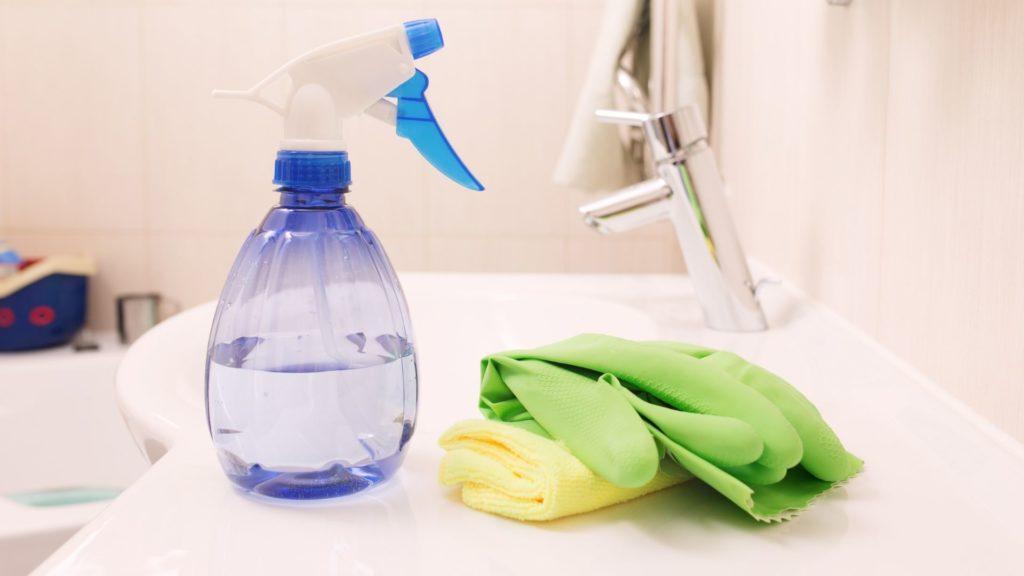If your kitchen faucet’s spray head has weak water flow, it may be blocked by calcium and mineral deposits. Vinegar can clear these blockages if the spray head is the problem.
Here is our step-by-step guide for cleaning your kitchen faucet’s Pull-down Spray Head.
You are watching: How to Clean a Pull-down Spray Head on Your Kitchen Faucet
Necessary Tools
- Clamp or Clothespin
- Sponge or Toothbrush
- Flat-head screwdriver
- *Adjustable Wrench
- Bowl or container
- Flashlight
- Pliers

Necessary materials
Distilled White Vinegar
Cleaning the aerator.
Read more : How to Clean the Top of Kitchen Cupboards [4 Simple Steps]
An aerator is a miniature screen that is found in the spout of kitchen faucets. This screen infuses the water flow with air so that tiny streams of water will emerge through the faucet head. Aerators are also utilized in spray heads however the precise position will largely depend on the brand and manufacturer of the faucet. Generally, you will find them located in the spray head exactly where the spray head joins the hose. A few manufacturers may position the aerator directly in the spray head top surface or face.

Step 1: How to Remove the Aerator from your pull-down faucet
- Pull out the spray head and hose.
- Block the hose so it cannot retract using a clamp or clothespin.
- Unscrew the spray head.
- Locate the aerator in the spray head or the hose connector.
- Carefully pry out the aerator. A small flat-head screwdriver is perfect for this task.
*If your spray hose’s aerator is positioned directly in the spray face, you will most likely need an adjustable wrench to unscrew the face and remove the aerator for cleaning.
Step 2: How to Clean the Aerator
- Rinse the aerator under a faucet and remove any mineral sediment with a sponge or toothbrush.
- Return the aerator to the spray head.
Step 3: Clean the Spray Head
If you have been using your spray head for quite some time, cleaning the aerator may not be sufficient. To clean the entire spray head:
- Fill bowl with distilled white vinegar.
- Place the spray head in the vinegar, submerging it.
- Soak the head overnight if possible.
- After soaking, rinse the spray head thoroughly with clean water and reconnect it to the faucet hose.
Another Type of Problem
Read more : What Color Walls Go With Grey Kitchen Cabinets [Schemes]
If you find that after cleaning both the aerator and the spray head, the flow of water is still rather weak, it’s time to verify if there is another problem at the root of your weak water flow.
Unscrew the spray head from the faucet hose. Observe the flow of water. Is it a full flow that is steady and consistent? If not, the obstruction may be sitting deeper down in the pipes. A common headache is the fitting at the other end of your faucet’s hose. This is usually a connector made from plastic, and it also can be the victim of mineral sediment build-up. It, too, should be cleaned with vinegar.
Step 4: Cleaning the faucet hose fitting.

- Go underneath into the cabinet housing your sink and plumbing and using a flashlight locate where the faucet hose emerges from the spout tube.
- Follow the hose from this point until you reach where it connects to the body of the faucet.
- Squeeze the tabs holding it in place to pull it apart.
- Using pliers, unscrew the fitting from the spray hose
- Soak the plastic quick-connect fitting for a few hours in the distilled vinegar.
- When finished soaking, rinse it thoroughly in clean water and return it to its position.
Now the water flow should finally be restored to a full stream.
Source: https://gardencourte.com
Categories: Kitchens

